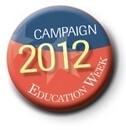Charlotte, N.C.
Unions have always been a huge part of the Democratic get-out-the-vote machine. But will volunteers really knock on doors and make phone calls for the president who pushed teacher evaluation that relies on standardized testing, expanded charter schools, and put in place a school turnaround plan that calls for getting rid of teachers?

Yes, National Education Association and American Federation of Teachers leaders and delegates here say. Why? Partly because they think Mitt Romney and the Republicans would be way worse.
“It’s a mixed bag,” said Linda Myers, who recently retired from her role as a campaign consultant for the Michigan Education Association, an NEA affiliate, said of Obama’s education record. “But he’s willing to listen. With our options, he’s the best guy for the job.”
Obama’s embrace of policies like merit pay and teacher evaluation have been a bit of “a problem” in recruiting folks to campaign for him, she admitted. Still, cuts to benefits and pay at the local level, brought on by the GOP in her mind, will get plenty of troops out, she assured me.
And Republicans’ push to dismantle collective-bargaining rights in a number of states (most famously in Wisconsin) are also likely to fire up volunteers.
“Without collective bargaining, the rest of it is mute,” said Melissa Cropper, the president of the Ohio Federation of Teachers, an AFT affiliate. “If Romney wins, there won’t be room for discussion at all.”
Jeff Freitas, the secretary-treasurer of the California Federation of Teachers, another AFT affiliate, said he thinks the administration may even be softening a bit on some of its polices. He noted, for instance, that the words “Race to the Top” never appear in the Democratic platform.
“I think they’re moving away from it,” he said. (Politics K-12 readers: Do you agree with that interpretation? Comments section is open.)
At first, he was a little worried that some folks in the union wouldn’t come out to help Obama get re-elected. But now he’s a lot less concerned. People “see the dangers of losing this election,” he told me.
Of course, delegates here also say they’ve found plenty to like in the administration’s agenda, including the fact that Obama poured billions of dollars into education, saving hundreds of thousands of teachers jobs, according to the administration’s estimates.
“I think his heart is definitely in the right place,” said Wanda Clemmons, a special education teacher from Los Angeles. She’s excited to go out and campaign for Obama again. “He’s had a balanced approach on education.”
Not Obama’ Fault?
In fact, some union delegates I talked to don’t seem to blame the president himself for some of the policies closely associated with his administration.
Michael Zagrobelny, a teacher from Pottsdam, N.Y., said he blames “anti-public education groups,” including StudentsFirst, which was started by former District of Columbia schools chancellor Michelle Rhee, for the proliferation of policies, like merit pay.
I asked Deborah Barnes, a teacher from the North Clackamas district in Oregon and a delegate to the convention, what she thought of Obama’s expansion of charter schools, something the administration encouraged through its Race to the Top competitive-grant program.
He didn’t do that, she told me. That was U.S. Secretary of Education Arne Duncan, not Obama. “I think Duncan has his own agenda.”
(Readers: Agree with the idea that you can distinguish Obama and Duncan? Or do you think the president and secretary work together?)



